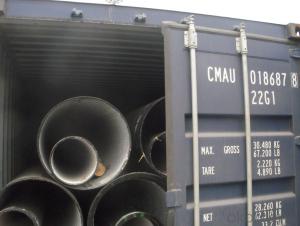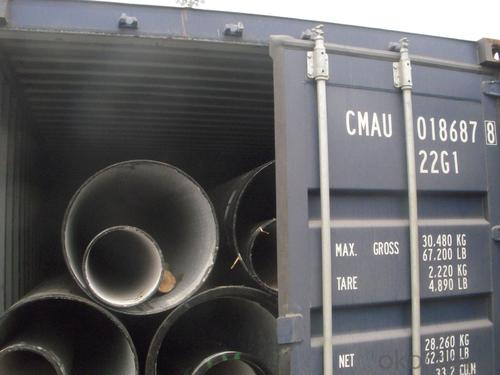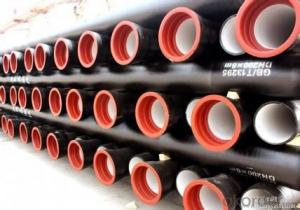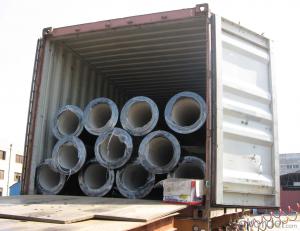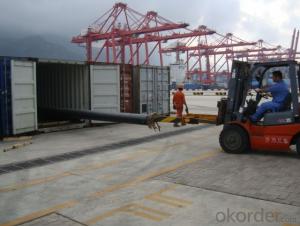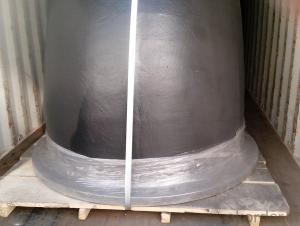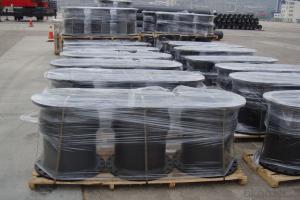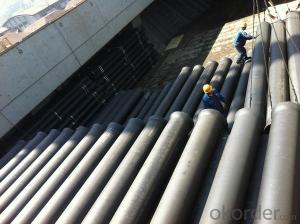DUCTILE IRON PIPE C Class DN 900
- Loading Port:
- Tianjin
- Payment Terms:
- TT OR LC
- Min Order Qty:
- -
- Supply Capability:
- 30000Tons m/month
OKorder Service Pledge
OKorder Financial Service
You Might Also Like
CNBM ductile iron pipe ranges from DN80-DN1600mm (T-Type, Class K9), effective length 6m, comply with ISO2531 Standard
Company Profile
CNBM International Corporation is the leading production base and renowned supplier of Ductile Iron Water Pipe systems of both potable and waste water in China. We are constantly looking to develop high quality products to ensure the longest service life and wonderful performance.
CNBM Pipelines regard quality as the essential factor leading to successful business. Every pipe is tested in accordance with BS EN545 (water application) or BS EN598 (sewer application). CNBM Pipelines products comply with and are tested according to the relevant European and International Standards. Our pipes are manufactured under the quality management system BS EN ISO 9001. After years of efforts, CNBM Pipelines has built up great reputation in terms of quality and service among customers worldwide
Product Introduction
CNBM ductile iron pipe ranges from DN80-DN1600mm (Tyton, T-Type, Class K7/K8/K9), effective length: 6m, complying with BS EN545/EN598/ISO2531/BS4772.
Specification& Payment terms
Internal lining: Pipes shall have an internal cement mortar lining in acc with ISO4179.
External coating: Pipes shall be externally coated with metallic zinc spray plus a further layer of resin painting to ISO8179.
Gasket: 100% SBR/NBR/EPDM gasket in accordance with ISO4633.
Packing: Pipes from DN100 to DN300 be bundled with steel belts, the others are in bulk.
Payment term: By 30% T/T advance payment + 70% Irrevocable L/C at sight.
Packing: In bulk vessel or in container.
- Q: The difference between ductile cast iron pipe and machine-made cast iron pipe
- Of different uses, ductile iron pipes are widely used for municipal water supply and drainage, rural drinking water and outdoor fire fighting works; mechanism cast iron pipes are mainly used in the city.
- Q: Can ductile iron pipes be installed outdoors?
- Ductile iron pipe is a kind of cast iron. It is an alloy of iron, carbon and silicon.
- Q: How does ductile iron pipe perform in corrosive soils?
- Ductile iron pipe performs exceptionally well in corrosive soils due to its unique composition and protective lining. The iron in ductile iron pipe is more resistant to corrosion than other materials, such as steel. Additionally, the interior of the pipe is often lined with cement mortar or an epoxy coating, providing an extra layer of protection against corrosive elements. This combination of materials enables ductile iron pipe to withstand the effects of corrosive soils and maintain its structural integrity over an extended period of time.
- Q: Are ductile iron pipes suitable for bridge piers or abutments?
- Yes, ductile iron pipes are suitable for bridge piers or abutments. Ductile iron is known for its high strength and durability, making it a reliable choice for supporting heavy loads in bridge construction. Additionally, ductile iron pipes are corrosion-resistant, which is crucial for structures exposed to moisture and environmental factors.
- Q: Water supply pipe is ductile iron, then it's fittings and valves and other parts must be ductile iron?
- Valve parts and materials do not require the same pipe material, as long as it can meet the use requirements and cost-effective.
- Q: Can ductile iron pipe be used for pump stations?
- Yes, ductile iron pipe can be used for pump stations. Ductile iron pipe is a commonly used material for underground water and wastewater systems, including pump stations. It offers several advantages such as high strength, durability, and corrosion resistance, making it suitable for such applications. Additionally, ductile iron pipe is compatible with various types of pumps and is known for its long service life, making it an ideal choice for pump station projects.
- Q: How are ductile iron pipes protected against external damage?
- Ductile iron pipes are protected against external damage through a combination of various protective measures. One common method used is the application of a protective coating on the external surface of the pipe. This coating acts as a barrier, preventing the direct contact of the pipe with corrosive elements in the surrounding environment. The coating can be made of materials such as epoxy, polyurethane, or zinc, which provide excellent resistance against corrosion, abrasion, and chemical attacks. Additionally, ductile iron pipes can be further protected by encasing them in a concrete or cement mortar lining. This lining provides an extra layer of protection, reducing the chances of physical damage due to external impacts or soil movement. The concrete or cement mortar lining also helps to improve the pipe's hydraulic performance by reducing friction and maintaining a smooth flow of water or other fluids. Furthermore, ductile iron pipes are often installed with proper bedding and backfilling techniques. This involves using suitable materials such as sand or gravel to support and stabilize the pipe, minimizing the risk of external damage caused by uneven ground settlement or heavy loads. Adequate compaction of the backfill material is crucial to ensure the long-term integrity and stability of the pipe. Regular inspection and maintenance are also essential for protecting ductile iron pipes against external damage. Periodic inspections can identify any signs of corrosion, coating degradation, or physical damage, allowing for timely repairs or replacement before significant issues arise. Additionally, proper cathodic protection systems can be employed to prevent corrosion by applying an electric current that counteracts the electrochemical reactions occurring on the pipe's surface. In summary, ductile iron pipes are protected against external damage through the application of protective coatings, concrete or cement mortar linings, proper bedding and backfilling techniques, and regular inspections and maintenance. These measures collectively ensure the durability, longevity, and reliable performance of ductile iron pipes in various environments and applications.
- Q: Are ductile iron pipes suitable for use in food processing plants?
- Ductile iron pipes are indeed suitable for use in food processing plants due to their numerous advantageous qualities. Firstly, they possess immense strength and durability, enabling them to withstand high-pressure situations. This feature proves crucial in food processing plants where pipes encounter diverse pressures during liquid and slurry transportation. Moreover, ductile iron pipes exhibit exceptional resistance to corrosion. This attribute becomes paramount in food processing plants as the pipes come into contact with various types of food, beverages, and cleaning agents, which can gradually corrode them. The corrosion resistance of ductile iron pipes ensures the pipes' integrity and safeguards the food products from contamination. Furthermore, these pipes display remarkable resistance to temperature fluctuations, rendering them suitable for the extreme temperature conditions often present in food processing plants. They can endure both hot and cold fluids without compromising their structural integrity. Additionally, ductile iron pipes possess a smooth inner surface, contributing to the maintenance of food product quality and purity. The smooth interior minimizes deposits like scaling or biofilm, thereby reducing the risk of bacterial growth. This quality proves essential in food processing plants where maintaining a hygienic environment is of utmost importance. Lastly, ductile iron pipes are easy to install and maintain. They boast a lengthy service life and require minimal upkeep, thereby minimizing downtime and associated costs in food processing plants. Considering these factors, ductile iron pipes emerge as a reliable and suitable choice for use in food processing plants. They ensure the safe and efficient transportation of fluids while meeting the industry's stringent hygiene and quality requirements.
- Q: How are ductile iron pipes protected against erosion caused by high-velocity flow?
- Ductile iron pipes are protected against erosion caused by high-velocity flow through various methods. One common approach is to apply an internal lining to the pipe, which can be made of materials such as cement mortar or polyethylene. This lining provides a smooth surface that reduces the friction and turbulence of the flowing water, thus minimizing the erosion potential. Additionally, external coatings, such as bitumen or epoxy, can be applied to protect the outer surface of the pipe from erosion caused by external factors like soil movement or abrasive materials. Regular inspection and maintenance of the pipes also play a crucial role in identifying and addressing any erosion-related issues to ensure their long-term durability.
- Q: Are ductile iron pipes suitable for potable water applications?
- Ductile iron pipes are indeed suitable for potable water applications. Their reliability and durability have been demonstrated through their longstanding use in water distribution systems. These pipes exhibit a commendable resistance to corrosion, a crucial factor in upholding the quality of drinking water. Moreover, ductile iron pipes possess a high tensile strength, reducing the likelihood of breakage or leakage. Furthermore, their smooth interior surface aids in maintaining optimal water flow and preventing the accumulation of deposits or contaminants. In conclusion, ductile iron pipes are an appropriate selection for potable water applications due to their impressive strength, durability, and corrosion resistance.
Send your message to us
DUCTILE IRON PIPE C Class DN 900
- Loading Port:
- Tianjin
- Payment Terms:
- TT OR LC
- Min Order Qty:
- -
- Supply Capability:
- 30000Tons m/month
OKorder Service Pledge
OKorder Financial Service
Similar products
Hot products
Hot Searches
Related keywords
